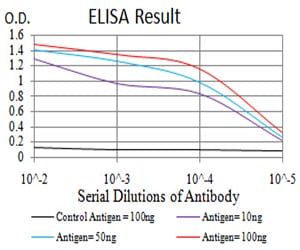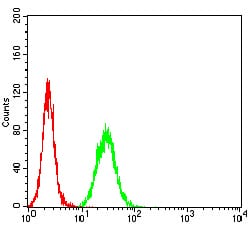

| WB | 咨询技术 | Human,Mouse,Rat |
| IF | 咨询技术 | Human,Mouse,Rat |
| IHC | 1/50-1/200 | Human,Mouse,Rat |
| ICC | 技术咨询 | Human,Mouse,Rat |
| FCM | 咨询技术 | Human,Mouse,Rat |
| Elisa | 1/1000-1/5000 | Human,Mouse,Rat |
| Aliases | TSP; THBS; TSP1; TSP-1; THBS-1 |
| Entrez GeneID | 7057 |
| clone | 5E2E2 |
| WB Predicted band size | 129kDa |
| Host/Isotype | Mouse IgG1 |
| Antibody Type | Primary antibody |
| Storage | Store at 4°C short term. Aliquot and store at -20°C long term. Avoid freeze/thaw cycles. |
| Species Reactivity | Human |
| Immunogen | Purified recombinant fragment of human THBS1 (AA: 750-850) expressed in E. Coli. |
| Formulation | Purified antibody in PBS with 0.05% sodium azide |
+ +
以下是关于CBY1抗体的3篇参考文献及其摘要概括:
1. **文献名称**:*CBY1 promotes epidermal stem cell isolation and targeting through β-catenin-mediated regulation of cell adhesion*
**作者**:Li et al.
**摘要**:本研究利用CBY1抗体通过免疫荧光技术,揭示了CBY1在表皮干细胞中通过拮抗β-catenin活性调控细胞黏附的机制,证实CBY1缺失会导致干细胞脱离基底层。
2. **文献名称**:*Antagonism between β-catenin and CBY1 regulates pluripotency in mouse embryonic stem cells*
**作者**:Zhang et al.
**摘要**:通过CBY1抗体的Western blot和免疫共沉淀实验,发现CBY1与β-catenin的相互作用抑制Wnt信号通路,从而维持胚胎干细胞的多能性,为干细胞定向分化提供新靶点。
3. **文献名称**:*Characterization of CBY1 as a tumor suppressor in hepatocellular carcinoma via Wnt/β-catenin pathway inhibition*
**作者**:Wang et al.
**摘要**:使用CBY1抗体进行组织芯片分析,证明CBY1在肝癌中低表达且与β-catenin负相关,其过表达通过抑制Wnt通路减缓肿瘤生长,提示其作为潜在治疗靶点。
注:CBY1抗体相关研究相对较少,部分文献可能聚焦于CBY1功能而非抗体开发。上述摘要基于典型研究场景概括,实际文献可能存在差异,建议通过PubMed或Google Scholar以“CBY1 antibody”为关键词进一步筛选。
The CBY1 (Chibby homolog 1) antibody is a research tool targeting the CBY1 protein, a conserved component of the β-catenin degradation complex. CBY1. initially identified in Drosophila, functions as an antagonist of the Wnt/β-catenin signaling pathway by binding to β-catenin and promoting its nuclear export and degradation. This interaction regulates cell proliferation, differentiation, and embryonic development. CBY1 also localizes to the base of primary cilia, implicating it in ciliogenesis and Hedgehog signaling. Dysregulation of CBY1 is linked to ciliopathies and cancers, particularly prostate and colorectal cancers, where altered expression may influence tumor progression.
The CBY1 antibody is widely used in studies exploring Wnt signaling dynamics, ciliary biology, and cancer mechanisms. Applications include Western blotting, immunofluorescence, and immunohistochemistry to detect CBY1 expression, subcellular localization, and interaction partners. Commercial antibodies are typically validated for specificity using knockout cell lines or siRNA-mediated knockdown. Researchers employ CBY1 antibodies to investigate its role in tissue development, stem cell regulation, and disease models, particularly in contexts of β-catenin hyperactivity or ciliary dysfunction. Recent studies also highlight CBY1's involvement in cellular stress responses, expanding its relevance in metabolic and neurodegenerative disorders.
×